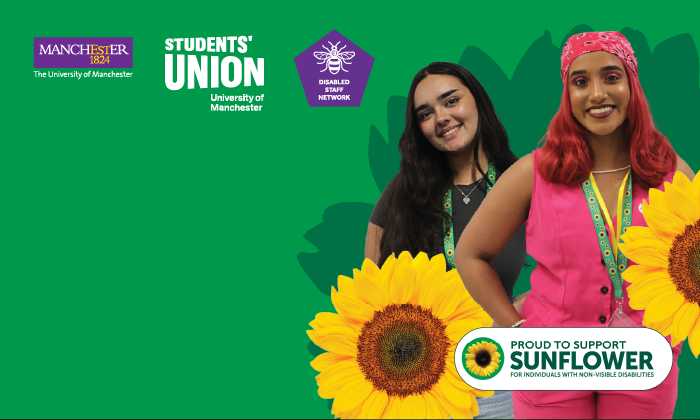Hidden Disabilities Sunflower Programme
24 Mar 2025
Recognising Hidden Disabilities with the Sunflower

This March, we’re launching the Hidden Disabilities Sunflower campaign across campus to highlight the challenges of hidden disabilities, and to create a more supportive environment for all our colleagues and students.
Not all disabilities are visible. Conditions such as autism, chronic pain, mental health conditions, hearing loss, or mobility issues may be hidden. The Hidden Disabilities Sunflower is a globally recognised symbol for individuals with non-visible disabilities. Wearing a Sunflower lanyard, badge, or card signals that a person may need extra time, patience, or assistance.
What is non-visible disability?
- Visit the Hiddent Disabilities Sunflower website for a list of non-visible disabilities.
- Find out more about Hidden Disabilities in our Youtube Video
‘We often say when addressing inequalities “you can’t be what you can’t see”. This campaign is vital as 24% of us have a disability, and 80% of those are not visible. To raise awareness, and to open up conversations and support of invisible disabilities across campus, it’s important that we highlight this campaign. We want the Hidden Disabilities Sunflower campaign to make a difference to everyone and become as recognised at the University of Manchester as it is in airports worldwide”.
Professor Jackie Carter, Academic Lead for EDI Disability , Chair of the Disability Confident Leader Self-Assessment Team
"For those of us with hidden disabilities, the lanyard provides solidarity, showing we’re not alone and our challenges are valid, even if invisible. It helps foster understanding, reduce assumptions, and create more inclusive environments”.
Rachel Heyes, Disabled Staff Network Co-chair
‘I am a massive advocate for this campaign because it is important for all students and staff to understand hidden disabilities and support those wearing a sunflower lanyard. Often, the needs of people with disabilities are ignored, but 24% of the working-age population are disabled, with 80% having hidden disabilities. It’s crucial to push the message that it’s okay to ask about someone’s needs. We need to elevate the voices of those with lived experience of disability to make real change.’
Aisha Akram, University of Manchester Students' Union's Wellbeing and Liberation Officer
Get involved
Collect a Sunflower lanyard on-campus
- For a full list of places on-campus visit Hidden Disability Sunflower
Hidden Disability Training
- LAOD150 Hidden Disabilities Sunflower (self-enrol)
How to Support students and staff
Digital Resources
- Download a variety of Digital Hidden Disability Sunflower Assets.
More information
